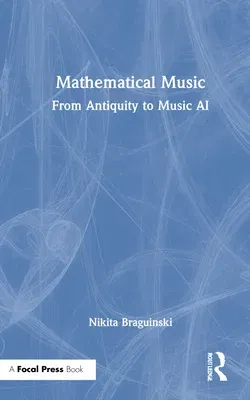Nikita Braguinski
(Author)Mathematical Music: From Antiquity to Music AIHardcover, 25 March 2022

Qty
1
Turbo
Ships in 2 - 3 days
Only 2 left
Free Delivery
Cash on Delivery
15 Days
Free Returns
Secure Checkout

Print Length
136 pages
Language
English
Publisher
Focal Press
Date Published
25 Mar 2022
ISBN-10
1032062207
ISBN-13
9781032062204
Description
Product Details
Author:
Book Format:
Hardcover
Country of Origin:
US
Date Published:
25 March 2022
Dimensions:
21.59 x
13.97 x
0.97 cm
ISBN-10:
1032062207
ISBN-13:
9781032062204
Language:
English
Location:
Oxford
Pages:
136
Publisher:
Weight:
317.51 gm